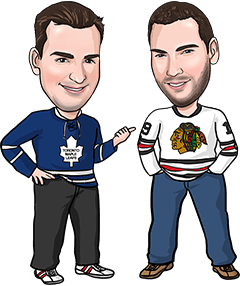 Whenever an NHL team’s season is interrupted by the all-star break, it can be difficult to handicap the rest versus rust impact that the break will have when the time comes to resume playing.
Whenever an NHL team’s season is interrupted by the all-star break, it can be difficult to handicap the rest versus rust impact that the break will have when the time comes to resume playing.
Sometimes, having a few days of R&R is just what players need to recharge their batteries, nurse some injuries or simply hit the mental reset button.
Other times, the all-star break comes at the worst possible time for a team that is on a roll (like the Bruins this year, on an 18-game point streak) and playing with tons of confidence, and they struggle to regain that momentum when they return.
Is there anything from the past that we can apply to handicapping games following the NHL all-star break?
Teams Typically Underperform After 4+ Days Between Games
Generally speaking, extended time off isn’t great for NHL teams.
According to a query we made at BetLabsSports, teams playing with four or more days rest between games were 447-459 from the start of the 2005-06 season until mid-January of 2017.

More significantly for bettors, wagering on teams in that situation resulted in a -5.9% return on investment, worse than teams playing the second night of a back-to-back (-3.4%) or even playing for the 4th time in 6 days (-4.9%).
It seems like the betting market underappreciates the disadvantages that come with playing after extended time off.
Stats Of Teams With 4+ Days Off Aren’t Relevant Here
Unfortunately, there’s not much from the history of teams struggling with 4+ days rest that we can use to apply to handicapping the first game back from the NHL all-star break.
Not only do those stats include times during the regular season when teams are practicing regularly during their 4+ days off between games, they also include bye weeks, when teams weren’t allowed to practice at all for 5 straight days.
Also, teams playing their first game following the all-star break are all in the same situation if they play each other on the first night back from the break.
What Trends Have Emerged In First Games Back From The All-Star Break?
Since the history of teams playing with 4+ days rest isn’t really that relevant here, we decided instead to look back over the last few years to see if any trends or patterns have emerged. And one definitely did.
Goals. Lots and lots of goals.
Using the betting totals for each game as a barometer of how much offense was expected in those matchups, here’s a breakdown of Over/Under/Push results on the first night back from the all-star break since 2012:
2017: 11-2-1
2016: 9-2-1
2015: 6-4-1
2014: no all-star break (Olympics)
2013: no all-star break (lockout)
2012: 7-5-1
—————
TOTAL: 33-13-4
Since 2012, more than 70% (71.7%) of games played on the first night back from the NHL all-star break have gone Over the betting total.
And over the past two seasons, the Over has cashed at an eye-popping rate of 83.3%.
Why Are So Many Games Going Over?
Obviously we’re dealing with a small sample size here, and we can’t expect Overs to cash over 70% of the time.
But just because a sample size is small doesn’t necessarily mean extreme results are irrelevant. Especially if there’s a logical reason to explain why, and we have a couple of theories:
Either goaltenders generally aren’t as sharp after all of those days off, or the defensive intensity is lacking enough to allow opposing shooters with better scoring chances than usual.
Regardless of the reason, goaltenders’ save percentages have collectively been drastically lower on the first day back from the all-star break than their full-season averages over the past two years.
In 2017, goalies combined to stop 781 of 875 shots (empty-net goals not included) for an .892 save percentage, a huge drop from the .910 full-season average.
The previous year, netminders posted a .901 save percentage (678 of 752), still well off the .910 average for the full season.
Conclusion
Betting anything blindly based only on trends is never a good idea, especially when it’s a trend with such a small sample size as this one.
However, the extremity of this trend makes this something that we can’t afford to ignore, either. Whether it’s rusty goaltenders, a lack of defensive intensity or something else, the first day back from the NHL all-star break has featured more goals than usual for several seasons in a row.
Until we see a reversal in this recent trend, we’ll look to be more aggressive in pulling the trigger on games in which we like the Over, and we’ll think twice before betting the Under.
What do you think? Is this something you’ll keep in mind when betting on games after the all-star break? And why do you think games after the break have been so high-scoring?

